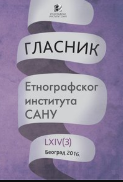Путеви трансформације традиционалних дечијих игара Срба у Товаришеву
Changes in Traditional Children’s Games among Serbs in Tovariševo
Author(s): Aleksandar KrelSubject(s): Recent History (1900 till today), Cultural Anthropology / Ethnology, Cognitive Psychology, Developmental Psychology
Published by: Етнографски институт САНУ
Keywords: Tovariševo; Bačka; Vojvodina; traditional children’s games; play; play activities; competitive games; changes; modification; reduction;
Summary/Abstract: The topic o f this paper is change and transformation in traditional children’s games among Serbs in Tovariševo. These games used to be played for a long time in almost intact form, until the second half of the 20th century. All traditional children’s games from Tovariševo are classified into three basic groups: competitive games, competitive-drama games and imitation-drama games. This paper emphasizes competitive traditional children’s games; that is, various playful activities exhibit by boys only. The games in question could serve as an example of connection between children’s play and socio-economic and cultural systems where games originated in the first place. Moreover, these games represented a significant mode of socialization: they helped children to acquire socially desirable and expected characteristics. This particular type of game had tremendous educational, cognitive and developmental functions. In decades following World War II, under the pressure of global socio-economic and cultural changes that encompassed the former Yugoslavia, these traditional children’s games started to change gradually, following the changes in a rural, traditional way of life. The changes in socio-political settings, economy, innovations brought by technical culture and changes in family structure in general, led to a formal transformation in the structure of games. A number of traditional games were reduced, some disappeared all together, or underwent modification and modernization. Traditional games that once corresponded to rural socio-economic and cultural settings are gradually disappearing, surrendering to the ones that match up to the needs of “modem” villages.
Journal: Гласник Етнографског института САНУ
- Issue Year: LII/2004
- Issue No: 1
- Page Range: 91-108
- Page Count: 18
- Language: Serbian

